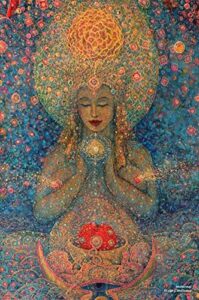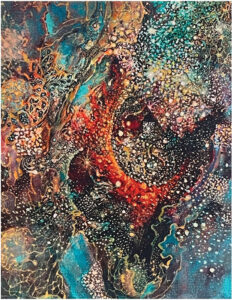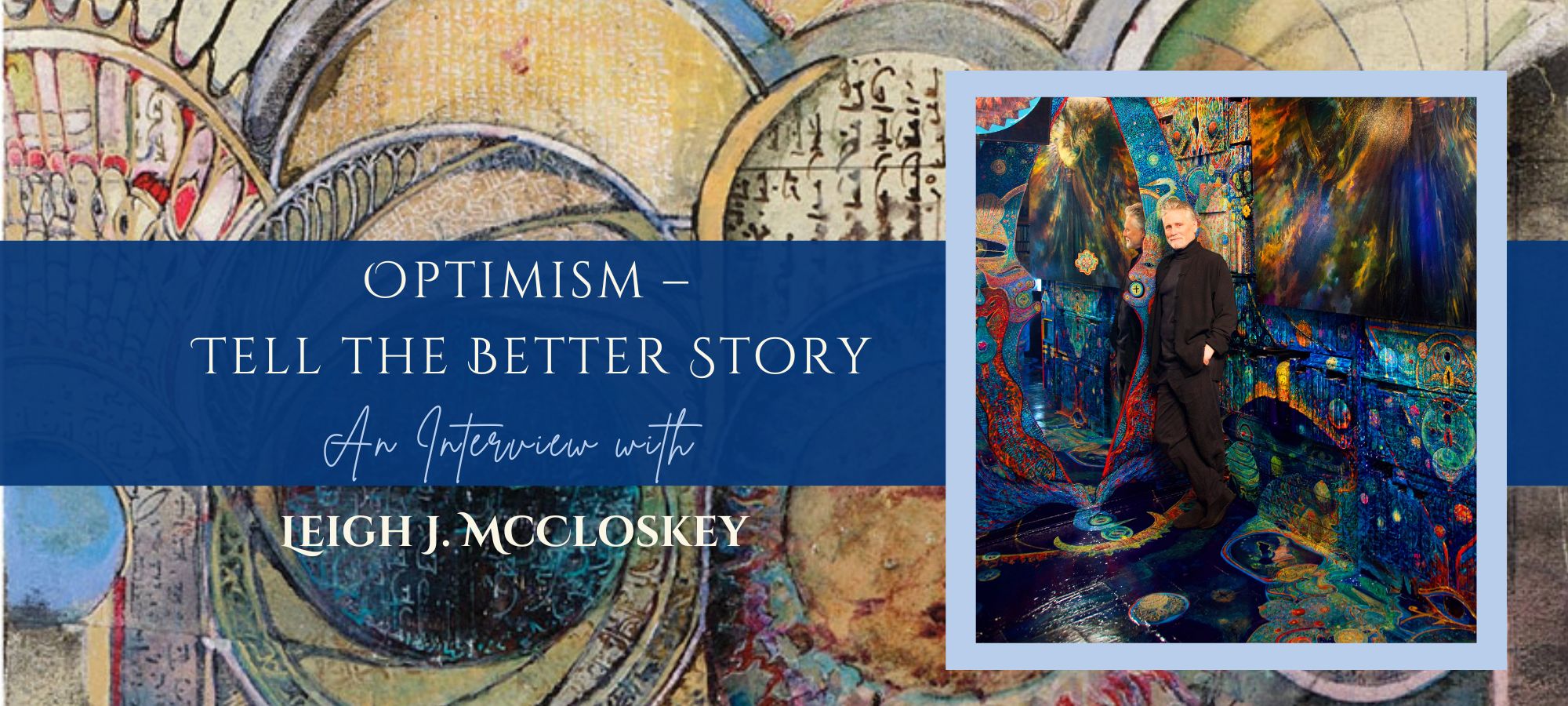Leigh J. McCloskey is an artist, author, and actor, most well known for his role in the television show Dallas. Pacifica was fortunate to have Leigh give the commencement address of 2024. To watch excerpts from the speech, visit us here: https://bit.ly/3ZRlxRg.
Angela Borda: The title of your commencement address to 2024’s class of graduates at Pacifica was “Optimism – Tell the Better Story.” There are so many ways that telling our stories, listening to the stories of others, and interweaving the mythic stories of the past are fundamental to our work at Pacifica. What inspired the topic of your address and how do we, as tenders of the psyche, tell a better story?

Leigh J. McCloskey: In addressing the commencement, I decided to go over the qualities that have helped me in navigating the “real” from what is actually happening. Often what I think is real only exists in my mind or it’s something I’m reacting to that is not truly part of the situation. My desire has been to cultivate mental clarity. What do I pay attention to? What are my tools in doing that?
I always go back to the three things my father told me. “Be true to yourself, know yourself, and never laugh at another’s dreams.” The last one creates behavior toward others that is not at their expense, and it makes them contributors, gardeners who bring something unique to the garden, to the story. And knowing yourself, being true to yourself creates the groundwork for the hero’s journey. What does it mean to be true to yourself? It leads us to the mentoring energy. Art is not a product, it’s an approach. When we’re mentored by the not-knowing of something, we have to step into the mystery. We must figure it out and it must figure itself out through us.
Angela: One excerpt from your talk that really stood out for me was “Our times are a clarion call to the creative heart and imagination and a type of artistry within human anguish that asks each of us to consider what being human truly means.” Can you speak about the alchemical role of the artist or the creative heart in times of suffering?
Leigh: The role of the artist and the creative heart in difficult times of confusion and dread is indeed the transmutive alchemical key to history and your own true humanity. Because if you cannot escape a condition, you must transmute it or be undone by it. Human trauma is encoded in the DNA. Alchemy and the artistry of consciousness are essential keys to the present moment and creatively transmuting human anguish into an art of being human, cultivating a garden within rather than a formula, theory, or medicated version of self. As Jung asserted, “Not out, but through!”
Alchemy is soul science, an organic process, and the art of holistic integration through personal engagement and direct knowing, i.e., “innerstanding.” The perfecting of the Philosophers Stone/the Art is the work of spiritualizing matter and materializing spirit, and therefore alchemy is called, “The Art,” and the alchemist, “the artist.” From very early in my life, I experienced a deep closeness to nature and simultaneously a type of aloneness from others. I felt that no one gives you an instruction manual on how to be human and that you must resolve this inner dilemma for yourself, otherwise you are adopting another’s story as your own and therefore never comfortable in your own skin.
Angela: How does the anguish of human artistry relate to the archetypal hero’s journey?
Leigh: My despair is that the more you love, the more you’re alone; the more things matter to you, the more you suffer in a world that doesn’t seem to care. If anything is to be done, you are the one who has to do it. You can’t allow the world’s disinterest to make you give up your dreams. If you think about the hero’s journey, you have to decide that when nobody else cares, you will care, and you will care tenfold.
When we begin to see the fundamental nature of consciousness, we are pulled away from our reactive self and pulled back to who we are, which are instruments. You have infinite ways of playing that instrument. The life pattern of an astrological chart can be interpreted in a thousand ways, but the fundamental structure is there and this helps us understand archetype and patterning, taking it from self-expression into a deeper sense of allowing the voice to free itself in you. It’s like dance. When the music moves through you, the body doesn’t need to be told to move, it just does.
Angela: Please tell us a little about your house, Olandar, which has your paintings on canvases but also directly on walls and on furniture, essentially turning your home into art.

Leigh: Joseph Campbell helped us look at life through the hero’s journey, and when I look at Olandar, I think in those terms. The question is, how do we emancipate the beauty within us that leads not to narcissism but to sharing the beauty. Our home is situated on sacred ground, on Chumash land. I was born two miles from here on the Solstice and have always felt a profound sense of custodial responsibility to the land. This feeling amplified when I moved here and raised our family.
We’re used to looking at art rather than being inside of it. And it’s just a different vision. Everything in my house is painted, even the sofa and the floor. And with 3-D glasses, it becomes three-dimensional. The context here is that it’s domestic space, intimate space, and all of these revelations come from asking questions with a brush and pen about the nature of consciousness. This is an immersive environment, mapped in terms of the psyche.
Angela: The phrase “emancipation of the imagination” impacts me. Why is it we need to emancipate the imagination? What is it that binds the imagination or represses it or denies it? And how as an artist do you access that wellspring?
Leigh: We must emancipate imagination from fantasy or wishful thinking, which takes vigilance and self-examination. Imagination is a tool, an inner sentience, and it is an inner bridge that allows for relationship with the creative spirit and like the spirit of nature is a mentoring interaction. A great deal of inner work has to do with discernment and developing tools to help navigate the real from the illusory. Imagination leads us to artistry of thought, a willingness to work without reward and the realization that all true revelation is a living quality, an organic manifestation, not a concept, theory, or formula, but an art form. Fantasy and wishful thinking lead to concepts, excuses, explanations, and emptiness. Imagination develops and forms the vessel of consciousness by which we explore unknown possibilities and allows such things as wonder to become an informing voice and mentoring presence.
Angela: Thank you so much for your time in speaking with me and sharing your views with the Pacifica community. We look forward to seeing your future work.
To watch excerpts from the commencement speech, visit us here: https://bit.ly/3ZRlxRg. More information about Leigh’s work and Olandar can be found on his website at leighmccloskey.com.

Leigh J. McCloskey is an acclaimed artist, actor, author, and visual philosopher. Leigh’s fascinating and inspiring creative life, his visual and Hermetic philosophy, career as an actor and his personal “hero’s journey” have lead him into a lifetime devoted to exploring and reinvigorating the stories, myths, and arts that return dignity and meaning to our human struggle. He has enjoyed a professional acting career that now spans over four decades. He starred in three nighttime series, the most significant being the hit show Dallas. He is the author of several books and visual essays, including The Hieroglyph Of The Human Soul, Adam Reborn & Eve Restored, the Codex Tor Books I & II, and his masterwork of original art and writing on archetype, symbolism, and the hidden nature of the psyche, Tarot ReVisioned. He lives with his wife in Malibu in a house that has been transformed by his art into Olandar. For more information, please visit his website https://leighmccloskey.com.

Angela Borda is a writer for Pacifica Graduate Institute, as well as the editor of the Santa Barbara Literary Journal. Her work has been published in Food & Home, Peregrine, Hurricanes & Swan Songs, Delirium Corridor, Still Arts Quarterly, Danse Macabre, and is forthcoming in The Tertiary Lodger and Running Wild Anthology of Stories, Vol. 5.


